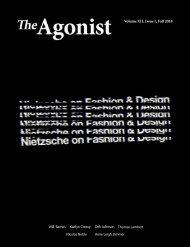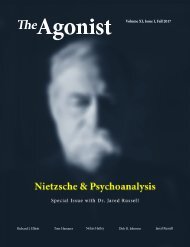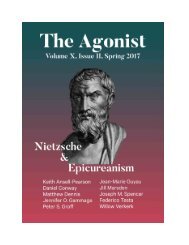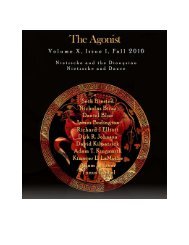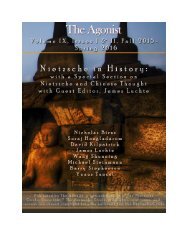Volume XII, Issue II, Spring 2019
You also want an ePaper? Increase the reach of your titles
YUMPU automatically turns print PDFs into web optimized ePapers that Google loves.
THE AGONIST<br />
Amor Fati Contra Time Machines<br />
Considering modernity, Nietzsche's diagnosis is clear: the phenomenon of<br />
ressentiment (resentment) is present. Then, it is not difficult to identify the reason<br />
why modern man believes in time machines. Firstly, modernity emphasizes<br />
individuation, insofar as it created the image of citizens as social atoms. However,<br />
as we saw, such an image is not appropriate when we adopt the notion of process<br />
of individuation. Secondly, that man of ressentiment believes that it is possible to<br />
travel into the past not only in order to witness historical events but in order to<br />
correct them. In The Birth of Tragedy, Nietzsche describes that type of man, whose<br />
archetype is Socrates, who believes “that thought, as it follows the thread of<br />
causality, reaches down into the deepest abysses of being, and that it is capable,<br />
not simply of understanding existence, but even of correcting it” (BT 15). I argue<br />
that the time machine fable is, above all, created by ressentiment, i.e., the<br />
phenomenon of ressentiment is the origin for hypothetical travels into the past.<br />
Such a fable comes from the impossibility of accepting fate. On the other hand,<br />
it is by means of the amor fati formula that Nietzsche denies the modern ressentiment<br />
and (likely) would reject time machines:<br />
My formula for human greatness is amor fati: that you do not want anything to<br />
be different, no forwards, not backwards, not for all eternity. Not just to tolerate<br />
necessity, still less to conceal it — all idealism is hypocrisy towards necessity —<br />
, but to love it... (EH “Why I am so Clever” 10).<br />
Han-Pile emphasizes that the Nietzschean formula assumes “a transformation,<br />
not of the past, but of ourselves” (242). Then we may conceive of amor fati as an<br />
alternative to time machines (and a criticism), i.e., the amor fati formula of<br />
Nietzsche “represents a human, heteronomous alternative to willing backwards<br />
(…),” according to Han-Pile (243).<br />
By associating time machines—in particular travels into the past—with the<br />
man of ressentiment, it is possible to advocate, as Nietzsche indicated in On the<br />
Genealogy of Morality, the lineage of modern science, which points toward the priest<br />
(the archetype or personification of ressentiment, according to Reginster 28 ), a<br />
representative of the ascetic ideal. For priests, the ascetic ideal means “the actual<br />
priestly faith, their best instrument of power and also the “ultimate” sanction of<br />
their power” (GM <strong>II</strong>I 1). Thus science, according to Nietzsche, “is not the<br />
28 Cf. Reginster, B. “Nietzsche on ressentiment and valuation.” Philosophy and<br />
Phenomenological Research 57 (2): 281-305, 1997, p. 289.<br />
38



